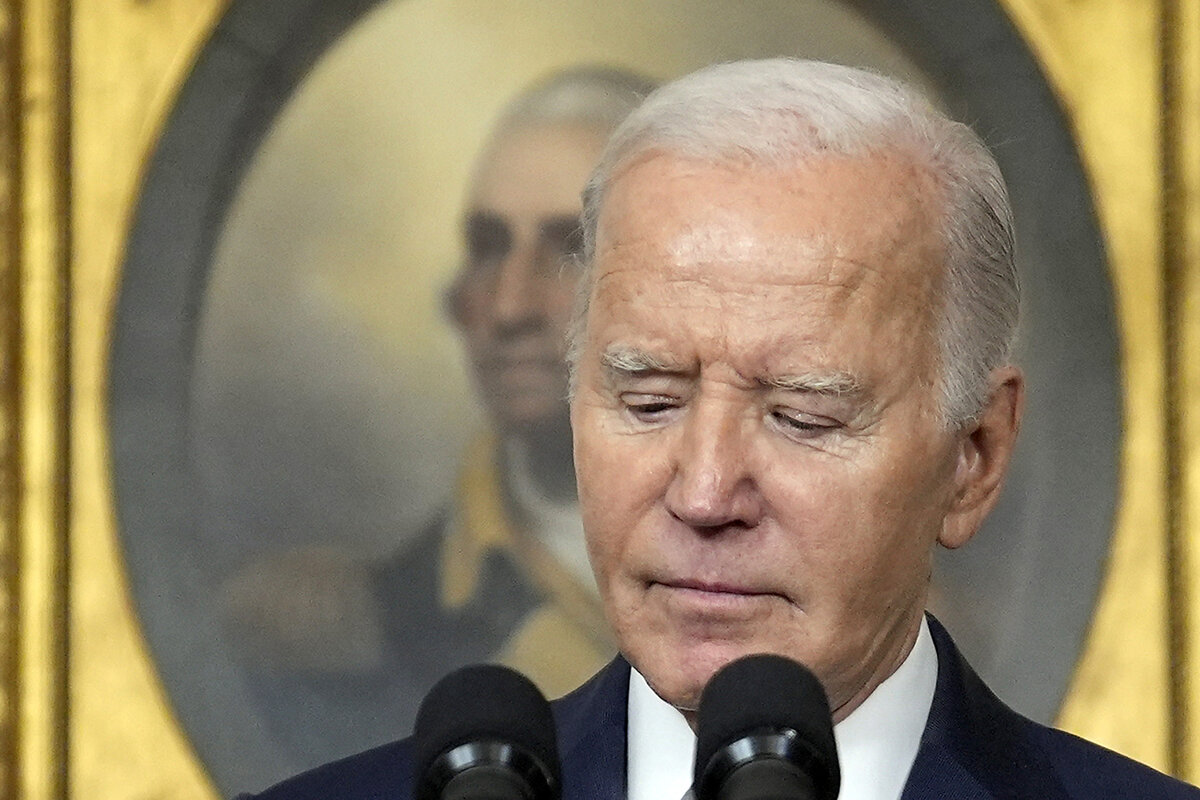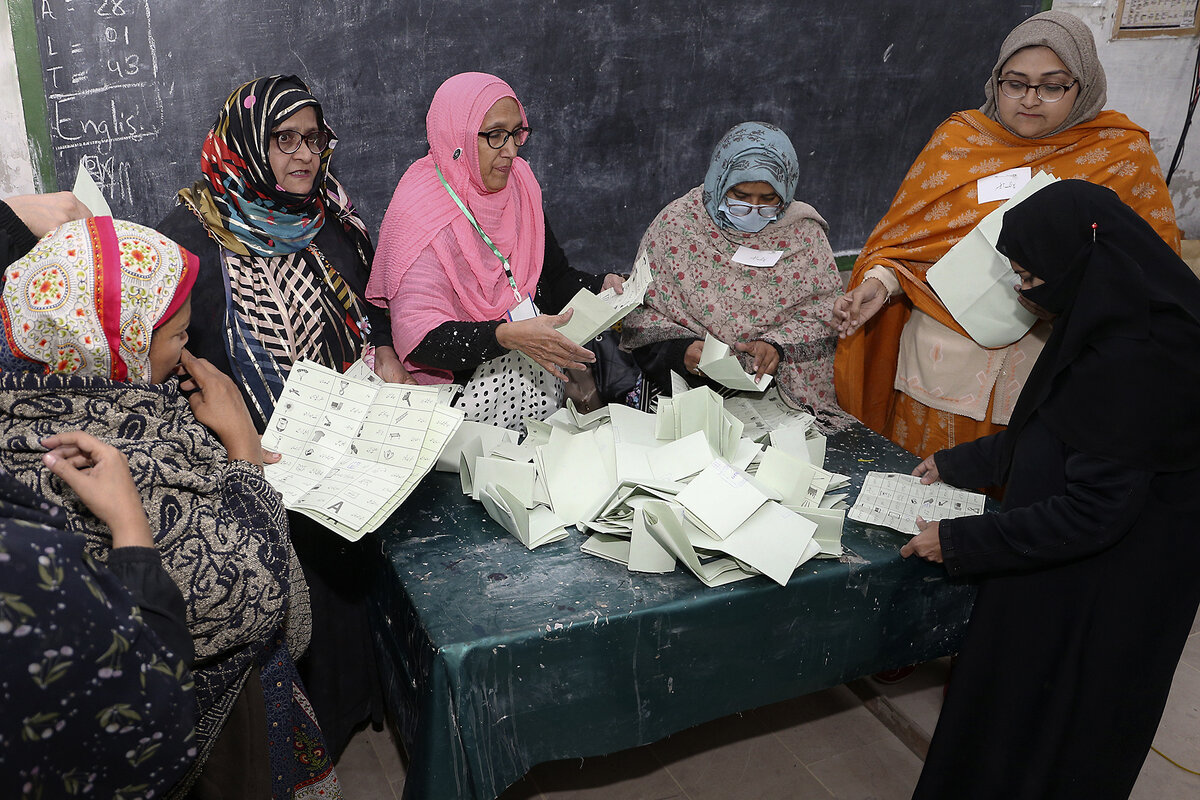The war in Ukraine is at a pivotal point, after a disappointing counteroffensive and a halt of U.S. aid. To help shore up Western support, Ukraine must now demonstrate a clear strategy.

Why is Christian Science in our name?
Our name is about honesty. The Monitor is owned by The Christian Science Church, and we’ve always been transparent about that.
The Church publishes the Monitor because it sees good journalism as vital to progress in the world. Since 1908, we’ve aimed “to injure no man, but to bless all mankind,” as our founder, Mary Baker Eddy, put it.
Here, you’ll find award-winning journalism not driven by commercial influences – a news organization that takes seriously its mission to uplift the world by seeking solutions and finding reasons for credible hope.
Explore values journalism About usMonitor Daily Podcast
- Follow us:
- Apple Podcasts
- Spotify
- RSS Feed
- Download
 Mark Sappenfield
Mark Sappenfield
Not too long ago, I wrote an article on the Abortion Talks – six Massachusetts women on opposite sides of the issue who continued a dialogue for six years. At the end of those six years, not one participant had changed her mind.
What was the point? Today’s article on Poland holds the answer. Building compassion can seem like a consolation prize. But it’s not. In today’s polarized world, only autocrats win all the time. For the rest of us, building compassion is the most practical way to ensure that law – in whichever direction it trends – remains temperate, thoughtful, and humane.
Already a subscriber? Log in
Help fund Monitor journalism for $11/ month
Monitor journalism changes lives because we open that too-small box that most people think they live in. We believe news can and should expand a sense of identity and possibility beyond narrow conventional expectations.
Our work isn't possible without your support.
Today’s stories
And why we wrote them
( 5 min. read )
Today’s news briefs
• Siege of Rafah nears: Israeli Prime Minister Benjamin Netanyahu says he has ordered the military to prepare a plan for the evacuation of the population of the southern Gaza city of Rafah ahead of an expected ground invasion.
• Colombia peace talks: Colombia’s government and a dissident faction of the former Revolutionary Armed Forces of Colombia (FARC) rebel group known as the Second Marquetalia say they have started a peace process.
• North Korea tourists: A group of Russian tourists arrives in North Korea. South Korea’s government says they are likely the first tourists from any country to enter North Korea since COVID-19.
• Maestro remembered: World-renowned conductor Seiji Ozawa led the Boston Symphony Orchestra from 1973 to 2002, longer than any other conductor in its 128-year history. He died Feb. 6.
( 4 min. read )
Comments in a special counsel’s report highlighted the issue of President Joe Biden’s age. The aftermath pointed to how the topic might take shape in the months ahead.
( 3 min. read )
Poland seems like a bitterly divided country, especially over hot-button topics like abortion. But there’s middle ground to be found. Even among conservative Poles who have voted for the hardest-line party, there’s a call for empathy.
( 4 min. read )
Pakistan’s election was marred by allegations of rigging before polls even opened on Thursday. Now, as a disruption in results draws additional scrutiny, this could become one of the most controversial votes in the country’s history.
( 5 min. read )
The Super Bowl is the latest indication of Las Vegas’ transformation into a pro sports hub. Aside from an economic boon, what has it done for the community?
Podcast

Not just the news: Probing for what a story is really about
News demands responsive coverage. But we at the Monitor are also purposely built to go deeper, to keep asking, “What’s this story really about?” That calls for framing stories through the lens of values. Up next: trust. I join our weekly podcast to discuss.
Introducing ‘Rebuilding Trust’
The Monitor's View
( 2 min. read )
Can acting from the heart to aid civilians harmed by war help open minds to ending that war? The idea has some validity from conflicts where belligerents bowed to the norm of recognizing the innocence of civilians in battle zones, creating a thread of trust. Now Thailand is poised to prove it.
This month, the Southeast Asian nation plans to start a pilot project to deliver aid to about 20,000 displaced civilians across its long border with Myanmar. Three years of fighting since a military coup in Myanmar has left at least a third of that country’s population in need of assistance. And the military, which often strikes entire villages with impunity, has lately suffered big losses in territory and troops to armed rebels. Those rebels include a pro-democracy group as well as individuals from Myanmar’s ethnic minorities.
If the aid plan expands deeper into Myanmar and the delivered goods are not diverted to military use, it “will be the building block for constructive dialogue and engagement within Myanmar,” said Thai Foreign Minister Parnpree Bahiddha-Nukara.” The aid effort, in other words, might help Myanmar’s warring factions find other common ground.
The “humanitarian corridor” also has the potential to welcome wider support. The aid will be delivered by the Red Cross in each country under supervision of the humanitarian arm of the 10-member Association of Southeast Asian Nations, or ASEAN.
Thailand’s motives may not be purely in line with international humanitarian law. Its leaders fear China and India, which also border Myanmar, may seek more influence as the conflict turns against the ruling military. The Thai military also worries Myanmar may split up.
In addition, the idea of a humanitarian corridor was heavily promoted during an election last year in Thailand by the youthful, progressive Move Forward Party. The party won the most seats and votes but failed to take power because of the Thai military’s heavy hand in politics. Now a military-backed government in Bangkok is pushing the aid plan, perhaps to win over disenchanted youth who want Thailand to be driven by international values.
Still, the Thai plan is “about paving the way for Myanmar to once again reengage and engage constructively with the international community,” Vice Foreign Minister Sihasak Phuangketkeow told Reuters. If Myanmar’s junta allows neutral aid workers to help the innocent without bias, it would indeed mark an embrace of international law. Such softening of hearts might harden up enough trust to end the war.
A Christian Science Perspective
Each weekday, the Monitor includes one clearly labeled religious article offering spiritual insight on contemporary issues, including the news. The publication – in its various forms – is produced for anyone who cares about the progress of the human endeavor around the world and seeks news reported with compassion, intelligence, and an essentially constructive lens. For many, that caring has religious roots. For many, it does not. The Monitor has always embraced both audiences. The Monitor is owned by a church – The First Church of Christ, Scientist, in Boston – whose founder was concerned with both the state of the world and the quality of available news.
( 3 min. read )
We can reliably count on God’s perfect care for us – and find healing.
Viewfinder

A look ahead
Thank you for joining us today, and we wish you a wonderful weekend. For Monday, we’re planning to share one of our recent cover stories from the Weekly magazine. It looks at the explosion of municipal fines and fees: how they have entrapped people trying to escape poverty, and how one man is helping others escape.








